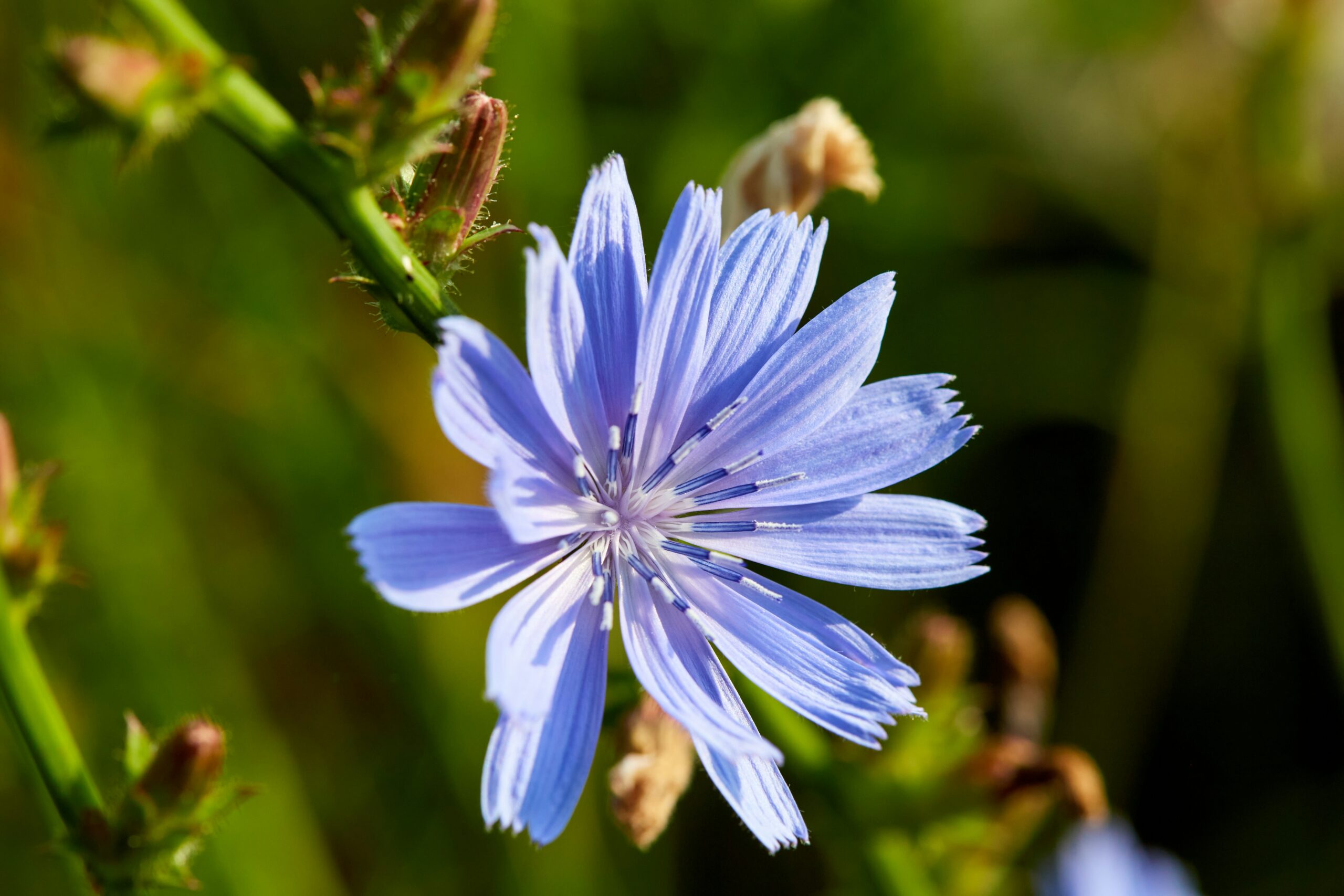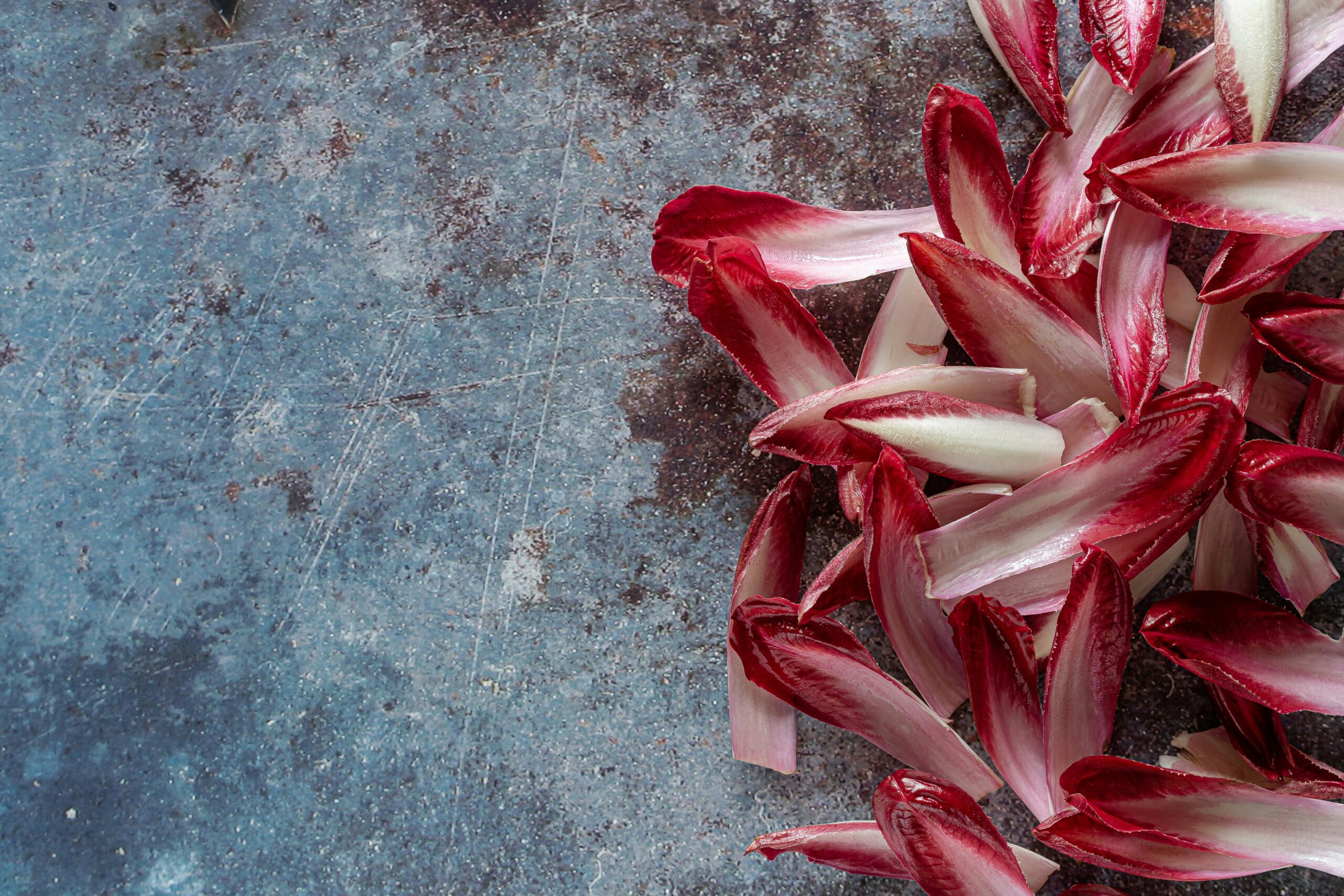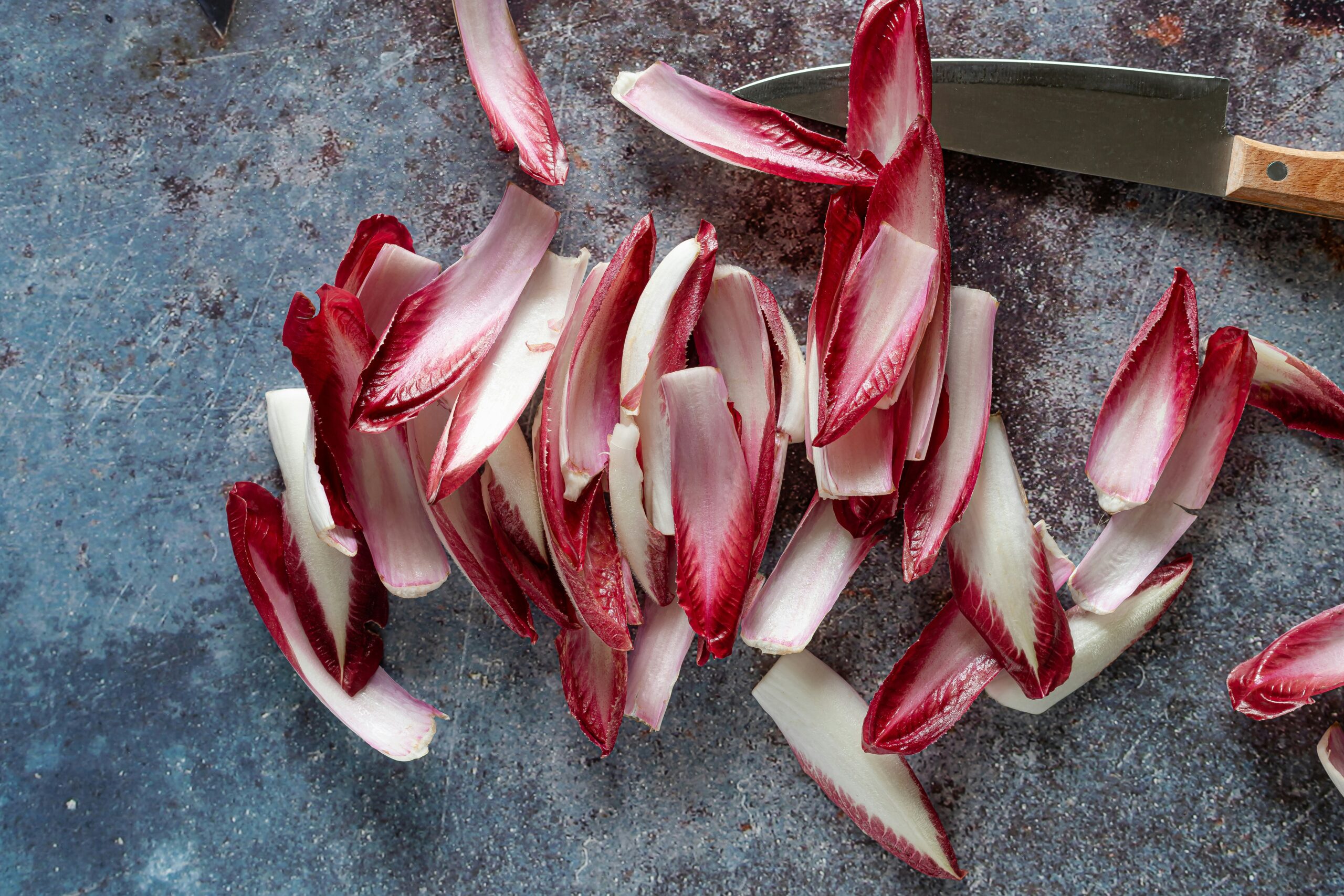Chicory here means a vegetable similar to lettuce. It is stiff, with minimal green foliage gathered in a rosette. Their form is narrowly oval, oblong. It can be an annual or a perennial plant. It is found in several regions, because it is resistant to frost. It grew not only as a wild plant, but in the temperate climate zone also as a cultivated variety. It has a long history of diverse use, but the most interesting is its medicinal use between prehistoric times.

There are various kinds of chicory, but one of the most prevalent is common chicory. Chicory, an Asteraceae family member, is a popular medicinal plant today. Plants have long been considered for their medicinal benefit, in addition to the food sector in improving the health benefits of the food items with sustainability. Another one that has a ton of interesting research behind it is chicory.
Until now, chicory has mainly served as animal feed, but in some rare cases, it has also found its way into the food industry. It can be eaten fresh. Besides that, dried chicory can also be used as a type of tea. Chicory supplement forms are also available. Chicory offers various compounds that might act as vehicles of food functionality. Discover the benefits and safety of chicory.
Chicory has been used since ancient Egypt, although the plant was used before its identification. In the 1700s, chicory was brought over from Europe to North America. Initially, chicory served as livestock fodder in northern Europe. Afterward, the unique benefits of this plant started to be discovered.
Chicory is available both fresh and dried for medicinal uses. Different extracts from the plant have also shown a diverse variety of biological and pharmaceutical activities. Chicory is an interesting vegetable that is worth introducing to your plate because it is rich in certain nutrients. Today, we are certain that you will learn some new information that will make you more frequently a consumer of chicory.

Chicory is the vegetable that keeps you safe from many germs! The latter, for instance, exhibits activity against some bacilli. According to the researchers, the plant extracts suppress the growth of plants such as Staphylococcus aureus![]() and Escherichia coli
and Escherichia coli![]() Gram-positive bacteria. The antimicrobial activity of the medicinal plant, as proposed by the authors of the present study, can be recommended for treating and controlling bacterial infections.
Gram-positive bacteria. The antimicrobial activity of the medicinal plant, as proposed by the authors of the present study, can be recommended for treating and controlling bacterial infections.
Besides, since chicory has activity against Candida albicans![]() , the disease fungus, it may also be used to treat fungal infections. Usually, we have an overpopulation of this harmful fungus in the body, but we can avoid it with the right products entered into a diet, like chicory.
, the disease fungus, it may also be used to treat fungal infections. Usually, we have an overpopulation of this harmful fungus in the body, but we can avoid it with the right products entered into a diet, like chicory.
Moreover, chicory extracts display considerable antiviral activity. It was one of the plants identified to have some activity against SARS-CoV-2![]() , for example. Therefore, this vegetable should be used for its antimicrobial activity.
, for example. Therefore, this vegetable should be used for its antimicrobial activity.
Chicory has another interesting property — the effect against parasites. So, you can already guess how much defensive force this vegetable has against it. The plant has a significant antiparasitic potential both for animals and human beings. The plant produces a range of bioactive compounds that may be used against parasites. For instance, among animal studies, chicory as a dietary factor in the overall intestinal parasites indicated that the feed reduced the number of intestinal adult parasites in lambs. So your body can protect itself from harmful agents better when you consume chicory.
Many medicinal properties of chicory extracts have been demonstrated in scientific studies. You might be interested in knowing that this vegetable protects the liver. The liver is a sensitive organ that can easily get damaged due to several factors. This organ can be weakened by, for example, consuming frequent alcoholic drinks. Clinical studies have demonstrated the measurably beneficial effect of chicory seed extract and other aqueous extracts obtained from vegetables on bilirubin levels![]() in human patients.
in human patients.
Liver function is mainly determined by serum bilirubin concentration. There have also been reported mitigation of liver damage. This is especially good news for steatohepatic liver disease patients. In conclusion, supplementing chicory seed could be a valuable means to counteract liver disease risk factors. In the majority of studies, the beneficial effects of the extracts were associated with their antioxidant activity.

Moving on to yet another upside of chicory point. This amazing vegetable can even decrease your glucose level. People with diabetes may be interested in this news. An aqueous extract of chicory and an extract of chicory seeds have been reported to induce hypoglycemic effects. Meanwhile, the plant, similar to many other plants, impacts some inflammatory mediators, myocardial enzymes, and histopathology of heart tissues in experimental diabetic cardiomyopathy![]() . Therefore, it can be suggested that chicory has benefits in managing diabetes and preventing complications.
. Therefore, it can be suggested that chicory has benefits in managing diabetes and preventing complications.
Due to caffeic acids present in whole chicories, it has been characterized as an effective anti-diabetic remedy by impacting glucose reuptake in the muscle tissues. Besides, chicory contains other materials with important effects that might benefit diabetes patients.
Everybody knows that cancers are deadly diseases. There are many things worth defending against, and you can name one of them as a healthy diet. According to researchers, chicory extracts are also likely to have anticancer effects, which is a good reason to include chicory in your diet. The vegetable has demonstrated action against diseases including breast cancer![]() and prostate cancer
and prostate cancer![]() . Research has shown that tumor progression is lower after applying the plant extract. Not only that but eating chicory and other vegetables with anticancer activity increases your protection against dangerous diseases.
. Research has shown that tumor progression is lower after applying the plant extract. Not only that but eating chicory and other vegetables with anticancer activity increases your protection against dangerous diseases.
Chicory might also be useful for heart health and cardiovascular health. The affirmative production activity of hypertension![]() was proved by leaf extraction. The extract-treated showed a marked decrease in blood pressure levels (systolic and diastolic) compared to the control group.
was proved by leaf extraction. The extract-treated showed a marked decrease in blood pressure levels (systolic and diastolic) compared to the control group.
Furthermore, the cardioprotective effect of the extract has been demonstrated by the inhibition of oxidative stress and pro-inflammatory cytokines. The vegetable also prevents hypertriglyceridemia![]() because administering aqueous chicory seed extract markedly lowers serum triglyceride levels. The above-listed actions are beneficial for cardiovascular health; therefore, they can also prevent other diseases.
because administering aqueous chicory seed extract markedly lowers serum triglyceride levels. The above-listed actions are beneficial for cardiovascular health; therefore, they can also prevent other diseases.

Neurotoxicity is a pathway that can lead to disturbances such as peripheral neuropathy. Peripheral neuropathy is an ailment in which the peripheral nerves moving information between the brain and other regions of the body have become damaged. Researchers also remarked that chicory may have a positive effect on neuropathy as well by enhancing the transmission. Chicory has an analgesic effect. Thus, various pain symptoms that usually accompany neuropathy are other symptoms. The vegetable includes compounds with fresh analgesic motion, giving patients a degree of sedative. The pain-relieving properties were similar to those associated with ibuprofen![]() .
.
You are familiar with chicory, and you already know many of its properties. Finally, we are focusing on the benefits of this specific veggie, which can benefit all persons' overall wellness. The key point is that the plant can regulate immune responses. Chicory is a medicinal plant with a long history of traditional use for disorders associated with the immune system. It helps protect the body from harmful agents by helping the immune system.
Furthermore, chicory can benefit different infections due to its ability to reduce inflammation. This vegetable makes wounds heal better and also protects against arthritis. Chicory is beneficial for health, so you should include it in your diet.
Chicory supplements can be made using roots, seeds, flowers, and leaves. However, the young leaves of this vegetable are used as food. Taproots are also added to some food products. Yet, chicory has a very high diversity of chemical compounds in all components. The types of nutritionally important compounds detected in chicory show their diverse and complex nutritional profile.
Chicorys contain carbohydrates, proteins, and lipids as their structural unit and major reserve materials —the role of carbohydrates in the plant's defensive response. The level of each constituent is based on the plant type, method of cultivation, and environmental conditions. Chicory also presents you with slightly fat scores. Hence, it is a feeble-calorie vegetable. Chicory contains only 23 kcal![]() per 100 grams. This is very little, so don't worry about a caloric surplus. They can also add some dietary fiber if they have chicory leaves and roots.
per 100 grams. This is very little, so don't worry about a caloric surplus. They can also add some dietary fiber if they have chicory leaves and roots.
Chicory leaves' protein, fiber, and carbohydrate content were higher, and the fat content was lower than that of other edible plants. There are also many more minerals and vitamins in this vegetable, some of which are quite valuable. Figure out what helps compose chicory for all the benefits you know.

All are aware that vegetables are a source of healthful vitamins. Chicory is no exception. In the leaves, you have a healthy amount of vitamin A, although 100 grams of chicory is not enough to cover the daily needs of this vitamin, so it is important to maintain a varied diet. Moreover, this vegetable will also contain B vitamins in small to medium amounts and vitamins C and E. But the biggest domination appears to be chicory, a very high dose of vitamin K![]() , and you will easily exceed the recommended daily intake of this vitamin. Thus, it is the group of vitamins for which chicory is worth eating.
, and you will easily exceed the recommended daily intake of this vitamin. Thus, it is the group of vitamins for which chicory is worth eating.
Chicory leaves also have a high mineral content, which is another notable chemical weapon. Chicory offers the highest manganese, by far. However, these values are still lower than your daily intake. Chicory will deliver calcium, potassium, magnesium, and others in even smaller levels. Although the values are small, with a diversified diet, you will avoid deficiencies more easily.
Not only the basic chemical compounds presented in chicory, this vegetable will also share with us these lesser-known terms. Chicory leaves have phenolic compounds or bioactive components associated with antioxidant activity.
Inulin![]() , an essential element of chicory, is also present. This substance is a type of fiber called a fructan. The vegetable has a bitter flavor signature. The bitterness that not everyone drinks about the inulin content. It's not just a strange addition — it also has several health benefits. Inulin can be used to lose weight and get healthier. It also enhances the absorption capacity of calcium and some other minerals. Inulin is also found in chicory roots, which makes it a natural source. Owing to its prebiotic properties, inulin also has great potential for use in developing functional foods.
, an essential element of chicory, is also present. This substance is a type of fiber called a fructan. The vegetable has a bitter flavor signature. The bitterness that not everyone drinks about the inulin content. It's not just a strange addition — it also has several health benefits. Inulin can be used to lose weight and get healthier. It also enhances the absorption capacity of calcium and some other minerals. Inulin is also found in chicory roots, which makes it a natural source. Owing to its prebiotic properties, inulin also has great potential for use in developing functional foods.
You may have never tasted chicory, but you should be thinking about its flavor and how to prepare this plant. This vegetable has a distinctive bitter taste that makes it unappealing to some. However, it is worth a try. Even the sour flavor and hue of the vegetable after processing can be used for brewing beer. You can also take chicory supplements to benefit from their health properties; consult your doctor beforehand.

The most common parts of chicory used for food and industrial purposes are roots, leaves, and flowers. However, young roots may be cooked similarly to other root vegetables. It's great as a vegetable side for various meals, and you can serve it with sour cream or a herby sauce. The roots can also be fried and added as greens to the soup for flavor. Fresh and young leaves of wild chicory are good for salads, especially loose with other leafy plants. Or, they can be stirred with bhaji style dosa, which means fried like spinach. Due to its bitterness, it pairs well with other common components, and thus, chicory is served mostly in salads.
When you are ready to eat, however, if you want to remove the bitter taste from the leaves, you can soak them in boiling water beforehand. The young leaves can also be crushed or boiled. That means there are a lot of different ways to consume chicory. One more interesting example is a functional drink that contains chicory root within itself. Chicory is another plant used as a coffee substitute, and you can even find powdered drinks from this plant in the market.
Now we move to another necessary question, which is the safety of chicory. Should you use it? You're about to find out. Products that are chicory or chicory extracts are generally recognized as safe. Different parts of chicory have been tested with no major toxicity effects. However, we still advise you to be cautious and avoid eating any excess products. Although rare, some people are allergic to chicory. Allergic symptoms may be systemic or local, different and even opposite to each other among individuals, from rhinoconjunctivitis, asthma, and anaphylactic reactions to contact dermatitis, depending on the person.
In some cases, reactions have been induced by inhaling inulin or baked products or swallowing dried chicory roots. This means that it could be worth making certain that you do not have an allergic reaction to this element of chicory.
Moreover, vegetables should not be associated with a few medications. Chicory improves liver function, but side effects can occur when using chicory for non-alcoholic steatohepatitis. Chicory inulin's effect on liver enzymes, calcium (Ca) metabolism, and blood factors has been reviewed by several researchers. So, it is always better to consult a specialist before starting a new eating practice.